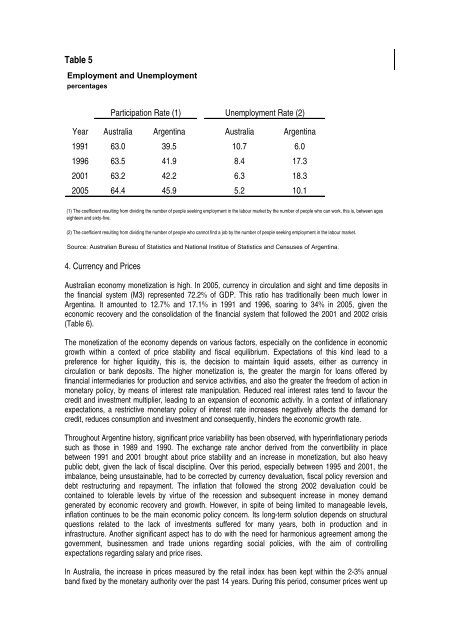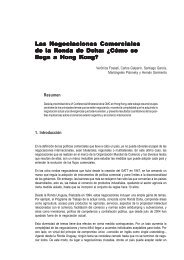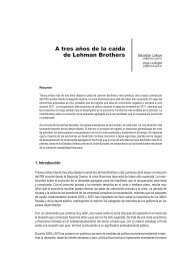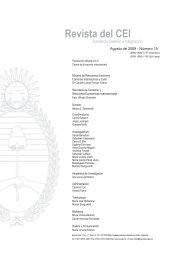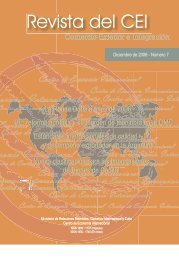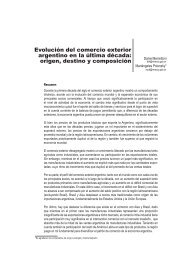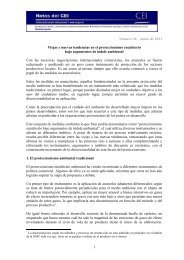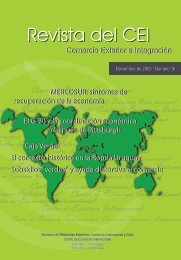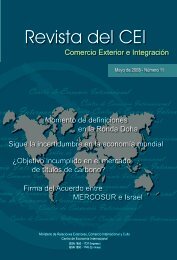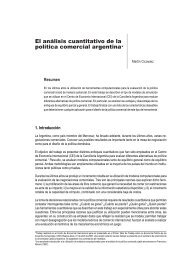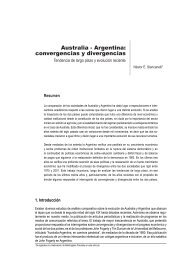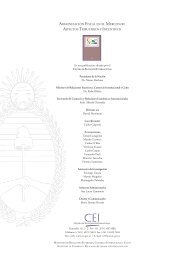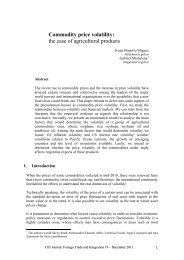Revista del CEI - Centro de EconomÃa Internacional
Revista del CEI - Centro de EconomÃa Internacional
Revista del CEI - Centro de EconomÃa Internacional
Create successful ePaper yourself
Turn your PDF publications into a flip-book with our unique Google optimized e-Paper software.
Table 5Employment and UnemploymentpercentagesParticipation Rate (1) Unemployment Rate (2)Year Australia Argentina Australia Argentina1991 63.0 39.5 10.7 6.01996 63.5 41.9 8.4 17.32001 63.2 42.2 6.3 18.32005 64.4 45.9 5.2 10.1(1) The coefficient resulting from dividing the number of people seeking employment in the labour market by the number of people who can work, this is, between ageseighteen and sixty-five.(2) The coefficient resulting from dividing the number of people who cannot find a job by the number of people seeking employment in the labour market.Source: Australian Bureau of Statistics and National Institue of Statistics and Censuses of Argentina.4. Currency and PricesAustralian economy monetization is high. In 2005, currency in circulation and sight and time <strong>de</strong>posits inthe financial system (M3) represented 72.2% of GDP. This ratio has traditionally been much lower inArgentina. It amounted to 12.7% and 17.1% in 1991 and 1996, soaring to 34% in 2005, given theeconomic recovery and the consolidation of the financial system that followed the 2001 and 2002 crisis(Table 6).The monetization of the economy <strong>de</strong>pends on various factors, especially on the confi<strong>de</strong>nce in economicgrowth within a context of price stability and fiscal equilibrium. Expectations of this kind lead to apreference for higher liquidity, this is, the <strong>de</strong>cision to maintain liquid assets, either as currency incirculation or bank <strong>de</strong>posits. The higher monetization is, the greater the margin for loans offered byfinancial intermediaries for production and service activities, and also the greater the freedom of action inmonetary policy, by means of interest rate manipulation. Reduced real interest rates tend to favour thecredit and investment multiplier, leading to an expansion of economic activity. In a context of inflationaryexpectations, a restrictive monetary policy of interest rate increases negatively affects the <strong>de</strong>mand forcredit, reduces consumption and investment and consequently, hin<strong>de</strong>rs the economic growth rate.Throughout Argentine history, significant price variability has been observed, with hyperinflationary periodssuch as those in 1989 and 1990. The exchange rate anchor <strong>de</strong>rived from the convertibility in placebetween 1991 and 2001 brought about price stability and an increase in monetization, but also heavypublic <strong>de</strong>bt, given the lack of fiscal discipline. Over this period, especially between 1995 and 2001, theimbalance, being unsustainable, had to be corrected by currency <strong>de</strong>valuation, fiscal policy reversion and<strong>de</strong>bt restructuring and repayment. The inflation that followed the strong 2002 <strong>de</strong>valuation could becontained to tolerable levels by virtue of the recession and subsequent increase in money <strong>de</strong>mandgenerated by economic recovery and growth. However, in spite of being limited to manageable levels,inflation continues to be the main economic policy concern. Its long-term solution <strong>de</strong>pends on structuralquestions related to the lack of investments suffered for many years, both in production and ininfrastructure. Another significant aspect has to do with the need for harmonious agreement among thegovernment, businessmen and tra<strong>de</strong> unions regarding social policies, with the aim of controllingexpectations regarding salary and price rises.In Australia, the increase in prices measured by the retail in<strong>de</strong>x has been kept within the 2-3% annualband fixed by the monetary authority over the past 14 years. During this period, consumer prices went up


